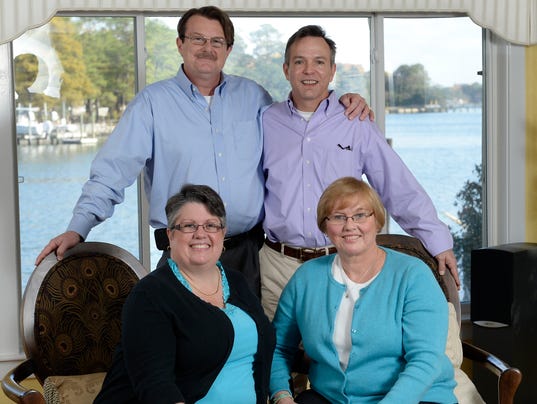
The Supreme Court blocked gay and lesbian couples from marrying in Virginia Wednesday as it edges closer to deciding whether same-sex marriage should be legalized nationwide.
The ruling puts on hold a federal appeals court's verdict last month striking down the state's ban on gay marriage. That case, like others that ended similarly in Utah and Oklahoma, is being appealed to the Supreme Court.
While nearly all federal and state courts have ruled in favor of same-sex marriage since the high court issued two landmark decisions in June 2013, judges have blocked nearly all such marriages while the cases are appealed. The justices had stepped in once before, in Utah, to do just that.
If the court declines to hear the Virginia appeal, the stay would be lifted and couples could begin getting married. Otherwise, those marriages would have to wait until the case is ultimately decided.
"The Supreme Court is making clear, as it already did in the Utah marriage case, that it believes a dignified process is better than disorder," said Byron Babione, senior counsel at Alliance Defending Freedom, which represents the Virginia court clerk opposed to same-sex marriage.
In six states — Arkansas, Colorado, Indiana, Michigan, Utah and Wisconsin — several thousand couples married before the process was interrupted by judges' subsequent rulings. That leaves those marriages in legal limbo.
Tim Bostic, the lead plaintiff in the case, said waiting for a final verdict is preferable.
"While we are disappointed that marriages will have to wait, this was not unexpected," he said. "We feel that this case deserves to be heard by the Supreme Court and be finally decided for all Americans."
Nineteen states and the District of Columbia allow same-sex marriage. It remains illegal in the remaining 31 states, although Colorado, Nevada and Wisconsin allow domestic partnerships or civil unions.
The first petitions seeking Supreme Court review were filed earlier this month in what appears to be a race to the nation's highest court. While Virginia's appeal has yet to be filed, proponents of gay marriage there -- including the state itself -- asked the justices to treat opponents' request to block marriages as an appeal of the case, which would speed up the process.
The justices will get their first crack at the broader issue in late September, when they meet privately to consider petitions that accumulated through the summer. They could grant one or more gay marriage cases for the 2014 term or wait for additional appeals.
More cases could arrive at the court this fall from the 6th Circuit appeals court, which heard cases earlier this month from Ohio, Michigan, Kentucky and Tennessee; from the 7th Circuit, which will hear Indiana and Wisconsin cases next week; and from the 9th Circuit, which will hear Idaho and Nevada cases early next month.
A three-judge panel of the U.S. Court of Appeals for the 4th Circuit in Richmond ruled 2-1 last month that gay men and lesbians have a constitutional right to marry. The ruling affirmed a district judge's decision rendered in February.
"We recognize that same-sex marriage makes some people deeply uncomfortable," said Judge Henry Floyd, originally appointed a district judge by George W. Bush and elevated to the circuit court by President Obama. "However, inertia and apprehension are not legitimate bases for denying same-sex couples due process and equal protection of the laws."
While state Attorney General Mark Herring, a Democrat, had sided with proponents, he urged the Supreme Court to block same-sex marriages until the issue is ultimately decided.
"A stay is warranted in light of the negative impact on Virginia children, families, and businesses if the Supreme Court eventually rules against marriage equality and forces an unwinding of Virginians' marriages, adoptions, inheritances, or workplace benefits," Herring said.
Lawyers for gay and lesbian couples contend that marriages performed in six other states during interim periods ultimately must be recognized. Those include:
Arkansas: More than 500 couples married in May before the state Supreme Court stayed a judge's ruling.
Colorado: Clerks in three counties issued marriage licenses to more than 350 couples in June and July before the state Supreme Court stopped them.
Indiana: More than 800 couples married in June before the 7th Circuit appeals court blocked a district judge's ruling. One marriage remained recognized, however, because of a terminal illness.
Michigan: More than 300 couples married on a single day in March before the 6th Circuit appeals court blocked a district court ruling.
Utah: More than 1,000 couples married in December and January before the U.S. Supreme Court stepped in and issued a stay of a district judge's ruling. The 10th Circuit federal appeals court affirmed the judge's ruling.
In May, District Judge Dale Kimball ruled that the state must recognize those 1,000-plus marriages, just as the federal government has done in most states that have legalized gay marriage. Recognition can affect issues ranging from adoption to state benefits. But the state successfully challenged that ruling at the Supreme Court, arguing that if it eventually wins its broader case, the marriages will be nullified.
Wisconsin: More than 500 couples married in June before a federal district judge put a stop to them.


No comments:
Post a Comment